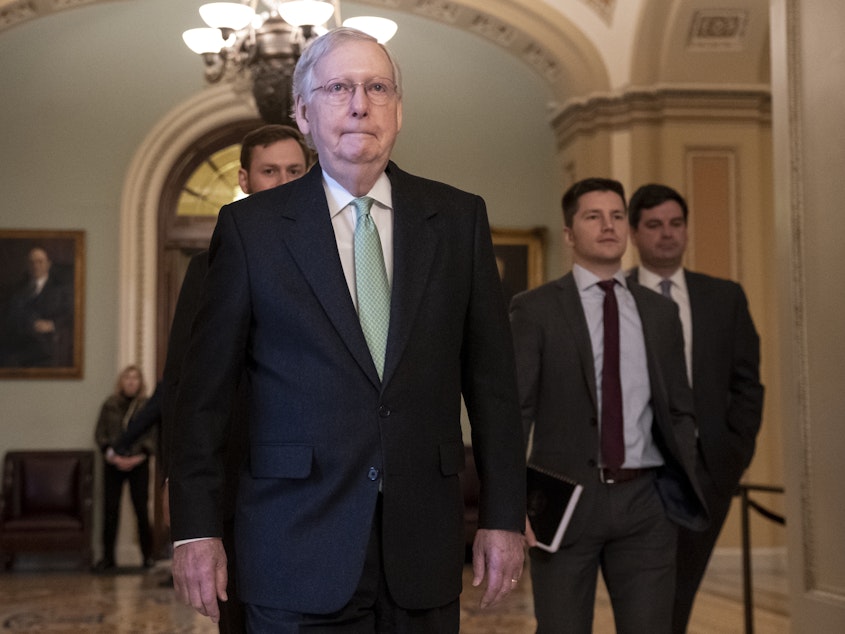McConnell: 'I'm Not Impartial' About Impeachment

Senate Majority Leader Mitch McConnell, R-Ky., dismissed the impeachment process against President Trump as a political proceeding rather than a judicial one.
"I'm not an impartial juror. This is a political process. There's not anything judicial about it," McConnell told reporters on Tuesday. "The House made a partisan political decision to impeach. I would anticipate we will have a largely partisan outcome in the Senate. I'm not impartial about this at all."
The House could vote as early as Wednesday to impeach Trump on charges that he obstructed Congress and abused power. Whether Trump conditioned aid to Ukraine on a Ukrainian investigation into the Bidens is at the heart of the impeachment proceedings against the president. Trump has denied that any such link was made, and in a letter Tuesday to House Speaker Nancy Pelosi, Trump compared his impending impeachment to "subverting America's Democracy."
McConnell's comments to reporters came after the majority leader rejected Democrats' request to call witnesses for Trump's Senate trial. Democrats had hoped to establish rules for evidence and witnesses well before a trial starts, possibly in January.
Sponsored
McConnell said on the House floor earlier Tuesday that it was not the Senate's job to build a case against the president.
"The House chose this road," McConnell said. "It is their duty to investigate. It is their duty to meet the very high bar for undoing a national election."
The speech was a response to a letter sent Sunday by Senate Minority Leader Chuck Schumer, D-N.Y.
In the letter, Schumer asked McConnell to agree to a set of rules similar to those used to govern the 1999 impeachment trial of then-President Bill Clinton. At the time, Senate leaders Tom Daschle, D-S.D., and Trent Lott, R-Miss., reached a bipartisan accord on the basic schedule ahead of the trial. A second set of rules was later approved along party lines to govern the handling of witnesses and evidence.
Democrats want to call four administration officials, including former national security adviser John Bolton and acting White House chief of staff Mick Mulvaney, as witnesses.
Sponsored
Schumer told NPR's Morning Edition this week that Democrats chose that list to establish additional information from individuals who have not yet testified in the House impeachment inquiry into Trump.
"These four witnesses have direct knowledge of why the aid to Ukraine was delayed," Schumer said in his letter. "We're not interested in dilatory tactics. We're not interested in introducing our own conspiracy theories. Just the facts, ma'am. And that's what these four witnesses will produce."
McConnell rejected Schumer's letter in its entirety. He said he would like to meet with the minority leader directly to resume talks on the structure of a trial.
"If this [impeachment trial] ends up here in the Senate, we certainly do not need 'jurors' to start brainstorming witness lists for the prosecution and demanding to lock them in before we've even heard opening arguments," McConnell said. "I look forward to meeting with the Democratic leader very soon and getting our important conversation back on the right foot."
McConnell told reporters Tuesday afternoon that he was "optimistic" that he and Schumer could agree on the first phase of the trial, which would include House managers and White House counsel presenting their cases to senators. But on Phase 2, which would be related to witnesses, McConnell said he expects that the two sides will have to disagree.
Sponsored
Even if McConnell and Schumer do not come to an agreement, senators can still try to call witnesses once a trial has begun. Those requests would be subject to a simple majority vote. Some Republicans want Hunter Biden, the son of former Vice President Joe Biden, to be called as a witness. [Copyright 2019 NPR]



